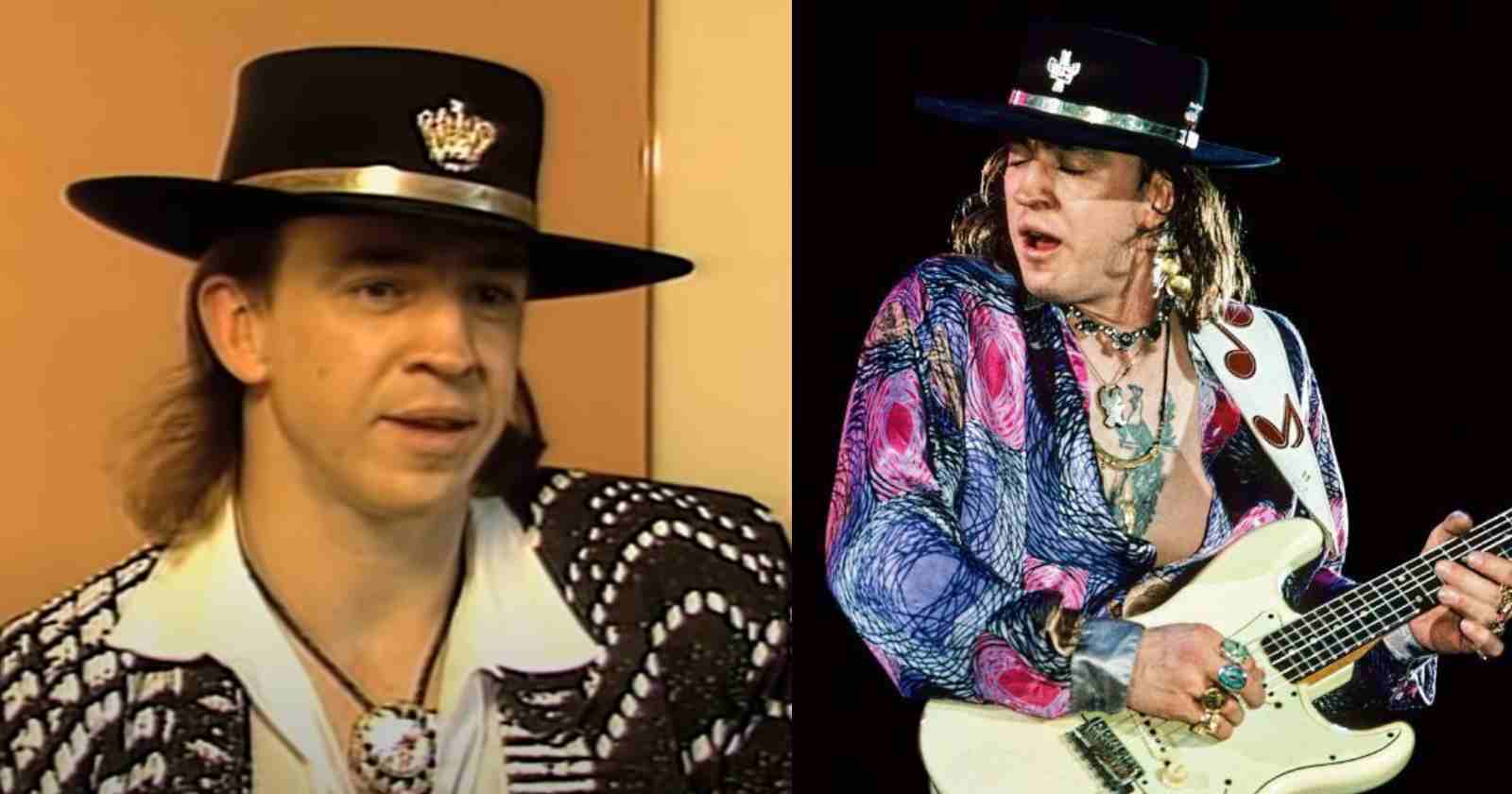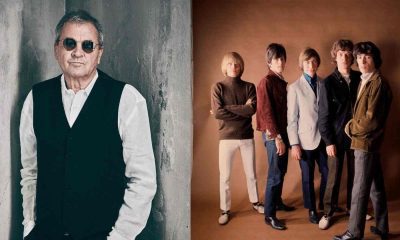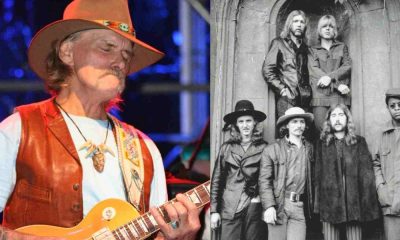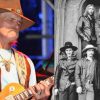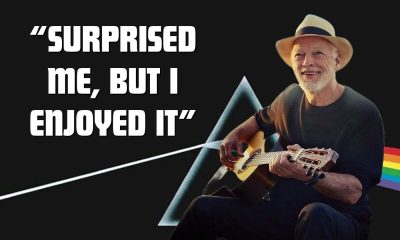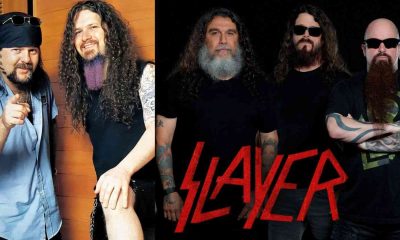ARTICLES
The 15 musicians that Stevie Ray Vaughan listed as his heroes
The late legendary guitarist Stevie Ray Vaughan had a short career, releasing only four studio albums when he was alive, with two more posthumous records. He tragically died in a helicopter crash in 1990 at the age of 35 but he became one of the most celebrated guitar heroes of his generation.
Advertisement
In a TV special about Vaughan back in 1990, hosted by John Sebastian from The Lovin’ Spoonful an interview with the late musician was broadcasted and he talked about the influence of Jimi Hendrix. He explained that people often compared him with Hendrix, not because he was similar to him, but because they had the same heroes. So Stevie Ray Vaughan mentioned 15 artists that were some of his heroes and Rock and Roll Garage selected what he had said over the years about them and his connection with some of them.
The 15 musicians that Stevie Ray Vaughan listed as his heroes
Jimi Hendrix
After releasing his first studio albums in the 80s and covering a few Jimi Hendrix songs, Stevie Ray Vaughan was often compared with the late American guitarist. He was one of his heroes and he recalled in an interview with Billy Pinnell in Australia back in 1984 (Transcribed by Rock and Roll Garage) how he reacted when he first heard a Jimi Hendrix record.
“It was in my bedroom, my brother brought his first record home before it was really released in the States. He had a connection. I’m not sure who it was and of course it blew me out.”
Stevie Ray Vaughan continued:
“At the same time you could hear where it was coming from. The music was quite different than anything I’d ever heard before. But the same influences where there. His influences had a lot to do with the same influences that I’ve grown up with, other than his influence in particular.”
“I mean, Albert Collins, B.B King, Albert King. These people where all rolled into Jimi Hendrix’s music. A lot of people don’t realize that and it’s a shame in one way but good in another. Now that it can be brought out and people can understand that,” Stevie Ray Vaughan said.
He once dreamed about Jimi Hendrix and they had a jam session
Curiously, Stevei Ray Vaughan revealed in an interview with MTV in 1984 (Transcribed by Rock and Roll Garage), that he once dreamed about Jimi Hendrix and they jammed together. He recalled that moment when he was asked if he had the chance to see Hendrix live.
“There was one where we waited up, for the whole dream we sat this far apart (a small distance). I showed him anything I wanted to show him. He showed me anything he wanted to show me and we tried to play one time.”
He continued:
“Right as a soon as I wake up, I ran to get one of my guitars but it dind’t work, nothing. I finally figured out a few months later that if it had been that easy I wouldn’t learn anything.”
“I just do my best to do what I can to carry his music on. This is much as anybody else’s music that I appreciated on my life. I love him, like he was my brother,” Stevie Ray Vaughan said.
The late Blues artist covered two Jimi Hendrix songs during his short career. “Voodoo Child (Slight Return)”, released on the 1984 album “Couldn’t Stand The Weather” and “Little Wing/Third Stone from the Sun”, released on the 1985 album “Soul To Soul”.
What Stevie Ray said about Hendrix’s technique
In another audio interview made available by Stevie’s Blues Youtube channel (Transcribed by Rock and Roll Garage), Stevie Ray Vaughan talked about Jimi Hendrix’s guitar playing technique.
“He would take harmonics, if he couldn’t take straight out of the guitar he would find an effect. I think he opened all those doors. I think he just continued to try to take things further.”
“He wasn’t afraid of talking about spiritual things in his songs and trying to grow. It’s obvious to me that he was trying to grow spiritualy. I think that was a new thing in Rock and Roll or Rock music. I think he stretched all the boundaries,” Stevie Ray Vaughan said.
Jeff Beck
Another legendary guitarist that Stevie Ray Vaughan praised and said was one of his heroes was Jeff Beck. The two met each other for the first time in Hawaii in 1981, before Vaughan had released his first studio album. 8 years later in 1989, the two musicians had the opportunity to tour together.
Called “The Fire Meets the Fury Tour”, the co-headlining tour happened back in 1989 and it was conceived by Epic Records, that paired the two guitarists together for a 29-day concert tour, that started in Minneapolis, Minnesota.
It was the third leg of the Stevie Ray Vaughan and Double Trouble’s “In Step Tour”. Besides being one of the highest-grossing concert tours of 1989, the tour won the Pollstar magazine award for most creative tour package of the year.
Many times during those shows the two artists would also play together on stage. In an interview to promote the tour at the time, Stevie Ray said about Beck: “When I was this big (a kid) I was watching him, listening to him”.
Jeff Beck said that Stevie Ray Vaughan was the closest thing to Hendrix when playing the Blues
In an interview with Classic Rock magazine in 2021, Jeff Beck talked about Stevie Ray Vaughan and said that he was the closest thing the world ever had to Jimi Hendrix, when it came to playing Blues.
“I met him at a CBS convention in Hawaii in 1981. He was a little worse for wear. He was eating KFC out of a box and then ate the box as well. We went on the road together in ’89. He’d got a beautiful new girlfriend and he was as straight as a die.”
“We were on the road for about three months. And then the tragic story was when he went in that helicopter he didn’t want to get on it. The people around him talked him into it by saying: ‘Look Eric (Clapton) has just got on one.'”
“So off he went and never came back. I think Stevie Ray was the closest thing to Hendrix when it came to playing the blues,” Jeff Beck said.
Eric Clapton
Eric Clapton was another British player that mixed Blues and Rock and Roll that inspired Stevie Ray Vaughan at an early age, becoming one of his heroes. In an interview wiht Andy Aledort in 1986, the Texan guitarist was asked to which kind of music he used to play along with in the early days and he mentioned Clapton’s records with John Mayall.
When Stevie Ray Vaughan started to achieve worldwide fame in the music industry, Eric Clapton was also impressed by the musician’s playing. In an interview for the film “A Tribute to Stevie Ray Vaughan” (Transcribed by Rock and Roll Garage), he recalled that the first time he heard him he was driving his car and had immediately to stop and listen to the song.
“I was in my car and I remember thinking ‘I have to find out before the day is over who that guitar player is. That doesn’t happen to me very often. About three or four times in my life I felt that way in a car listening to the radio where I’ve stopped the car, pulled over and listened. (I) thought ‘I’ve got to find out before the end day’.”
Clapton continued:
“Not sooner or later, but ‘I have to know now who that is’. I remember being fascinated by the fact that he never ever seemed to be lost in any way.”
“It wasn’t ever that he took a breather or paused to think where he was going to go next. It just flowed out of him. Always seemed to flow out of him and actually even that doesn’t come just with virtuosity, practice or any of those. It’s not a question of doing it over and over again or anything like that. It’s just that he seemed to be an open channel. He just flowed throught him, he never ever seemed to kind of dry up.”
“Because when I play, I sometimes stop. Every now and then I just stop and think ‘what I’m going to do know’. I don’t want to repeat myself so I get caught up somehow. You freeze and most players do, I never saw him do that. So he was channel in some way.”
Eric Clapton continued:
“I saw him play in London one time. So I sat about six rows back at the Hammersmith Odeon and for about the first 10 minutes I though I wasn’t going to be able to take it because it was so loud. I thought ‘I can’t take this’ and actually got used to it. Within 20 minutes after after that I was used to it and it was right, it got me, become all right.”
“At the same time was kind of like that thing I had to surrender to it completly and in a way. When we were in Alpine Valley I couldn’t let myself do that. I had to put up a bit of resistence in order to keep my own kind of self-esteem up. Because I wouldn’t been able to go on otherwise.”
“I’m not joking. To been up to completly absorbed by what he was doing, I would have thought “what’s the point?’ And done kind of done a runner and I cleared off, run away,” Eric Clapton said.
What Eric Clapton said about Stevie’s tragic death
The two musicians had the chance to share the stage many times during the 80s, including hours before Stevie Ray Vaughan’s tragic accident. Talking with Rolling Stone in 1991, one year after the tragic death of Stevie Ray Vaughan, Clapton talked about the musician.
“(I reacted) Much in the same way as I did to my son’s. I mean, there were more people involved. The death of my son was a directly personal situation. There was a convoy of helicopters, about five of them. They had to go back through this very thick fog up to about 100 feet above the ground.”
He continued:
“And once we came out of that, we just took off for Chicago. When I got back, I went straight to bed. I was woken about seven in the morning by my manager, Roger Forrester, saying that the helicopter with Stevie Ray and our chaps hadn’t come back. Then a bit later, someone discovered the wreckage. That was it.”
“The worst thing for me was that Stevie Ray had been sober for three years and was at his peak. When he played that night, he had all of us standing mere with our jaws dropped. I mean, Robert Cray and Jimmie Vaughan and Buddy Guy were just watching in awe. There was no one better than him on this planet. Really unbelievable,” Eric Clapton said.
B.B. King
Undeniably, Stevie Ray Vaughan’s biggest influences came from the American Blues music and one of his main inspirations was B.B. King. They had the opportunity to met each other and according to King they developed a father and son releationship.
B.B. King recalled that in an interview posted by SRV Archive Youtube Channel (Transcribed by Rock and Roll Garage). “When I first met Stevie I met him with his brother and after meeting him our communication started to be more like a father-son relationship. So we were very close, very, very close. He used to come to me when he had problems. He used to call me and we talked. I loved the guy.,” BB King said.
But besides being friends, they also had the opportunity to play together many times. B.B. King recalled in a conversation for the TV special “A Tribute to Stevie Ray Vaughan“, released in 1996 (Transcribed by Rock and Roll Garage), how unique and talented SRV was.
“Stevie had many ways of showing you that he had not only talent but he had the feel for playing Blues. His hands seemed to be flawless the way he moved with it.”
B.B. King continued:
“When I play, I play sort of like talking, you know, syllables. You say a sentence here, a sentence there. Then I have to stop and think for something else to keep my conversation going. But his didn’t seem to be that at all. It was fluent.”
“He flowed when he played. So he could get something going and it was like a song and it would just go on and on. Ideas continuosly flowed. I don’t have that. There is not a lot of people that I hear that have that. But Stevie had it,” B.B. King said.
Curiously, in 1996 Jimmie Vaughan (Stevie’s older brother), Eric Clapton, Bonnie Raitt, Robert Cray, Buddy Guy, Dr. John, Art Neville and B.B. King won the Grammy Award for “Best Rock Instrumental Performance” for the track “SRV Shuffle”.
Buddy Guy
Buddy Guy also was another American Blues legend that Stevie Ray Vaughan considered to be one of his heroes. Throughout the 80s the two artists had the chance to played together many times, including at ‘Buddy Guy‘s Legends’ on July 30, 1989.
In an interview shared by SRV Archive on Youtube (Transcribed by Rock and Roll Garage), Guy praised the late guitarist, saying: “Well, I got to know him as one of my best friends before he passed away. He was so much like myself when he it comes to that. There wasn’t anybody that he didn’t pick upon.”
“You could heard Otis Rush on him, you could heard B.B. King on him. Also you could heard Elmore James on him and he just went. So I think that that’s what makes a good guitar player. You get them all and you put them together. I guess that’s why gumbo tastes so good, because you put everything in it,” Buddy Guy said.
Buddy Guy said that SRV was responsible to bringing back the interest in the Blues music
In his autobiography called “When I Left Home”, Buddy Guy credited Stevie Ray Vaughan for bringing back the interest in Blues music in the 80s. He also revealed that right after Stevie’s final show, just a few hours before his tragic death, the late guitarist suggested that the two should make an album together.
“Rememberin’ Stevie, I thought that if it did happen, it was gonna happen in Blues heaven. I pictured the band–Muddy Waters, Otis Spann, Fred Belew, Little Walter, Stevie Ray Vaughan. That’s a band worth dying for,” Buddy Guy said.
Jimmie Vaughan
The first influences that anybody has in life are always from their own families, and it wasn’t different when it came to Stevie Ray. He said many times during his career that his first real influence was his older brother Jimmie Vaughan, who was three years older than him.
“A lot of my brother, because not only did he familiarize me with all this music, and all these people that play this music as well. But he was able to emulate a lot of their styles, but then, he was already developing his own.”
“I’ve still never heard anybody play quite like Jimmie. So, as a result, I have to say Jimmie Vaughan is probably my biggest influence,” Stevie Ray Vaughan said in the TV special in 1990 (Transcribed by Rock and Roll Garage).
Born in 1951, 3 years before SRV, Jimmie started his career during the late 60s and in 1969 the band he was playing with even had the opportunity to be Jimi Hendrix‘s opening act. The most famous band he was part of was The Fabulous Thunderbirds.
They’ve made an album together
The two musicians had the chance to record together in 1990 and their album “Family Style”, released as The Vaughan Brothers was released one month after Stevie’s death.
Talking with Guitarist magazine in 1988, Stevie recalled that just like every younger brother, he used to get old things from his older brother when was not using it anymore. One of the things were instruments. “With that kind of an influence as your big brother it’s real easy to get into playing. I saw how much fun he was having with it. Also I saw how dedicated he was to it. It gave me a lot of inspiration.”
“When he would leave, partially because he was big brother and you’re not supposed to touch big brother’s stuff. Also partly because he told me not to touch his guitar. Ahh, I did. Eventually he got an electric guitar and I got the one that he’d had. Then he got another electric guitar and I got his hand me-down. Soon after I was playing gigs around,” Stevie Ray Vaughan said.
The Beatles
The Beatles started a real revolution in music when they first appeared in the early 60s, taking Rock and Roll to a whole new level. They were an influence for artists from all music genres, including Stevie Ray Vaughan. In an interview with Michael Corcoran in 1983, he recalled that when he started playing the guitar when he was young, he used to perform Beatles songs with his brother and friends.
“When we were first startin’ off we had some friends of the family show us stuff. Like one guy played with Ray Sharpe and the Razor Blades. So right off the bat we were playin’ ‘Linda Lu’ (a Ray Sharpe hit), Jimmy Reed. Really hip stuff for little kids.”
“Jimmie came right out of the chute, bringing home records by everyone from Muddy Waters, Howlin’ Wolf, B.B. King and Buddy Guy to the Beatles and Hendrix to Wes Montgomery and Miles Davis. All this stuff at the same time. I don’t know how he got the idea to be so hip so quick,” Stevie Ray Vaughan said.
In 1995, a previously unreleased cover made by Stevie of the famous Beatles song “Taxman” was posthumous released on the album Stevie Ray Vaughan & Double Trouble Greatest Hits.
Hubert Sumlin
Another Blues legend that Stevie said was one of his heroes, Hubert Sumlin was born in Greenwood Mississippi in 1931, starting his musical career in 1953. He is often recalled for his work in Howlin’ Wolf’s band and is often considered one of the greatest guitarists of all time in specialized magazines like Rolling Stone.
In an interview back in 1985 (Made available by SRV on MV), Stevie talked about the artist and said that he was the driving force behind Howlin’ Wolf.
“Hubert Sumlin was the driving force behind Howlin’ Wolf and never, ever had his name on a Howlin’ Wolf record. He wrote a lot of those songs and nobody ever mentioned his name. Hubert Sumlin actually wrote ‘Killing Floor’. Hubert Sumlin is my twin brother.”
“(He) is like my flip-side twin brother. We wear the exact same hat size, clothes size, he calls me his little brother. Actually I call him my little brother. Hubert’s is probably the most original guitar player I know. He is wonderful,” Stevie Ray Vaughan said.
Little Richard
One of the godfathers of Rock and Roll music, Little Richard was a crucial artist for the birth of the music genre. He was influence to countless artists over the decades, including The Beatles, Rolling Stones, Elvis Presley and of course, Stevie Ray Vaughan.
He was part of the first group that was inducted into the Rock and Roll Hall of Fame back in 1986. Some of his biggest hits are “Tutti-Frutti”, “Lucille”, “Long Tall Sally” and “Good Golly, Miss Molly”.
Curiously, Jimi Hendrix was part of Richard’s band before he decided to creat his own group The Jimi Hendrix Experience.
Albert Collins
Stevie Ray Vaughan had many local heroes and one of them was Albert Collins. He was also born in Texas, but in the City of Leona back in 1932, 30 years before Vaughan was born.
Nicknamed “The Master Of The Telecaster (Guitar model),” Albert Collins was noted for the use of altered tunings and a capo. He is remembered for songs like “Cold, Cold Feeling”, “T-Bone Shuffle” and “Blue Monday Hangover”.
Stevie had the opportunity to share the stage with his brother and Collins in 1989 at the Bush inaugural ball. The musician died 3 years after Vaughan, in 1993 at the age of 63.
Albert King
Albert King is another “King” that Stevie considered a hero. Known especially for his classic 1967 album “Born Under a Bad Sign”, Albert is one of the most famous artists that used the Flying V guitar, years before it was popularized by Heavy Metal guitarists.
Stevie and King were good friends and had the chance to perform together in 1983 at the CHCH-TV studios in Canada when Vaughan was 29 and King 60. 16 years later, in 1999, that performance was transformed into an album called “In Session”.
Talking with Guitar World magazine in 1988, Stevie praised many guitar players including Albert King. He said: “They’re the pioneers and the innovators and they deserve respect for that. Listening to all the great records by Albert King and Albert Collins, Otis Rush, B.B. King. There’s millions of records we could talk about and each one of them is unbelievable in its own right.”
Albert died in 1992, two years after SRV, at the age of 69.
Howlin’ Wolf
Howlin’ Wolf is one of the most powerful voices that Blues music ever had. He is often recalled for classic songs like “Spoonful” and Smokestack Lightnin'” and was an influence to countless artists over the decades, including Stevie Ray.
The musician covered many Howlin’ Wolf songs on his studio albums, including the tracks “May I Have a Talk with You”, “Love Me Darlin'” and “Tell Me”.
In 1989, right after he released the album “In Step”, which had the Howlin’ Wolf song “Love Me Darlin'”, Stevie Ray talked in an interview with Steve Newton about the album and his decision to cover a few tracks.
“I like that era of blues a lot. I just happened to catch those songs along the line. It seems like, for some reason, around that time people stopped listening.”
“What I think it was, was that the record companies, not long afterwards, decided to make more money with something…else,” Stevie Ray Vaughan said.
Muddy Waters
Another Blues giant that SRV considered one of his heroes was Muddy Waters. He was lucky enough to perform with Waters a couple of times before the Bluesman passed in 1983 at the age of 70.
Muddy Waters in died in 1983 at the age of 70, two months before the Stevie Ray Vaughan debut album “Texas Flood” was released but the two musicians had the opportunity to meet each other before Waters passing.
“I’ve been really lucky, gettin’ to jam with most the people I’ve listened to” SRV told Steve Newton. Muddy Waters is one of the most influential Blues guitarists of all time. He is often recalled as the “father of modern Chicago Blues”. Some of his most famous tracks are “Mannish Boy”, “I’m Your Hoochie Coochie Man” and “Rollin’ Stone”.
Johnny Copeland
Another Blues guitarist that SRV said it was one of his heroes was Johnny Copeland that had a long career from 1950 until 1997 when he died at the age of 60.
With the revival of the Blues music in the 80s, he was invited to several festivals and in 1985 he had the opportunity to share the stage with Stevie Ray Vaughan to perform the song “Tin Pan Alley”.
Guitar Slim
Born in Greendwood, Mississippi in 1926, Guitar Slim had a short career that lasted until 1959 when he died at the age of 32 due to Pneumonia. His most famous track “The Things That I Used To Do” was covered by Stevie Ray on his 1984 album “Couldn’t Stand The Weather”.
The musician had the opportunity to meet Guitar Slim Jr. (The son of Slim) at the Great Woods Jazz Festival in 1989.
I'm a Brazilian journalist who always loved Classic Rock and Heavy Metal music. That passion inspired me to create Rock and Roll Garage over 6 years ago. Music has always been a part of my life, helping me through tough times and being a support to celebrate the good ones. When I became a journalist, I knew I wanted to write about my passions. After graduating in journalism from the Pontifical Catholic University of Minas Gerais, I pursued a postgraduate degree in digital communication at the same institution. The studies and experience in the field helped me improve the website and always bring the best of classic rock to the world! MTB: 0021377/MG


